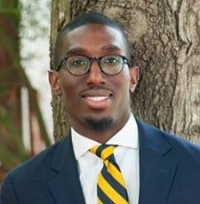Many people who were alive during the nation’s Civil Rights Movement felt that America stood still April 4, 1968, the day the Rev. Dr. Martin Luther King, Jr. was killed by an assassin’s bullet. The energy he had generated among millions in years of aggressive campaigning and preaching for progress and civility had suddenly lost its compass, steam and determination.
 Dr. DeShawn Preston
Dr. DeShawn PrestonToday, a half-century after his death, society is perplexed and sending mixed signals about whether it continues to embrace the civil rights-era goals and achievements that King and others fought and died for, say academics who focus on race relations and educational policy and practices.
“Things have changed in some ways. In others, we are where we were 50 years ago,” said Georgetown University law professor Sheryll Cashin, the daughter of Alabama civil rights workers John and Joan Cashin.
Most people today believe King was on “the right side of history,” said Cashin, who was 6 years old the year King was killed. “A lot of people believe in that in abstract, but not in structural change,” she said, voicing sentiments similar to those offered by some colleagues at institutions across the country.
Mixed signals abound, said Dr. DeShawn Preston, a higher education research scholar at the Southern Education Foundation. Preston suggested that many of King’s goals are still being pursued and many of King’s contemporaries in the struggle would be disappointed.
“In many ways, we’ve not progressed to where Dr. King had dreamed of,” said Preston, an Oakwood College graduate who last year earned a Ph.D. in educational leadership from the once racially segregated Clemson University.
“We’re still fighting and marching for our civil rights, most recently in Sacramento. I don’t imagine anywhere in his dreams he would imagine us being shot and killed and still fighting with our justice system.”
The battle with the justice system is similar in schools, said Preston, where the old racial segregation battle has raised its head in new ways to undermine integration. The surge in the ranks of students of color being expelled and suspended from public schools is such that those practices are blocking students from school.
“We’re fighting for another form of access as schools are resegregating again,” he said.
 Dr. Angela Valenzuela
Dr. Angela ValenzuelaDr. Karla Holloway, a professor of English and law at Duke University, offered a similar assessment.
“In my judgment, we are experiencing an erosion of rights won 50 years ago,” said Holloway, a 1977 graduate of Talladega College. “Additionally, the accomplishments of that era are directly and successfully targeted in invidious campaigns that recast privilege as a precarious value deserving of a defense. This tactic displaces those in need of equity and protection and reinstates corporate and personal power as our standard.”
Many note that much of the American landscape has changed for the good since King’s death. The many events scheduled this week across the nation range from a civil rights symposium and art display at Alabama State University in Montgomery, Alabama to a similar symposium in Nashville presented by Fisk and Vanderbilt universities in conjunction with Meharry Medical College and the American Baptist College – all participants in civil rights activities in the 1960’s.
Numerous institutions, both large and smaller, urban and rural, public and private,have scheduled activities centered on assessing where the nation and the academy are today compared to 50 years ago.
Preston said many of his peers who were not born when King gave his life are examples of the realization of King’s dream.
“HBCU’s still have the spirit of activists and social justice,” he said, citing as examples the students who have marched over and over during the past three years, seeking justice for fellow citizens. “HBCUs continue to graduate and produce the students who go out to help their communities.”
“While we (HBCU’s) may not reach the pinnacle,” Preston said, “they still work hard to produce and place students who carry out his dreams.”
King regularly spoke of the poor and underserved, regardless of color, during his lifetime, though it may have seemed more focused on the great divide between Black and White Americans. Among his ranks, yet rarely focused on or spoken of, were Hispanic Americans who celebrated him, mourned his loss and have benefitted from his calls.
Today, Hispanics see the progress King championed now getting mixed results.
“There has been a lot of research and studies” about the widespread needs of minorities and the poor, “but not much beyond that,” said Dr. Angela Valenzuela, a professor of education policy at the University of Texas, Austin. “We need to create new pathways,” she said, to achieve the “shared values” King preached.


















